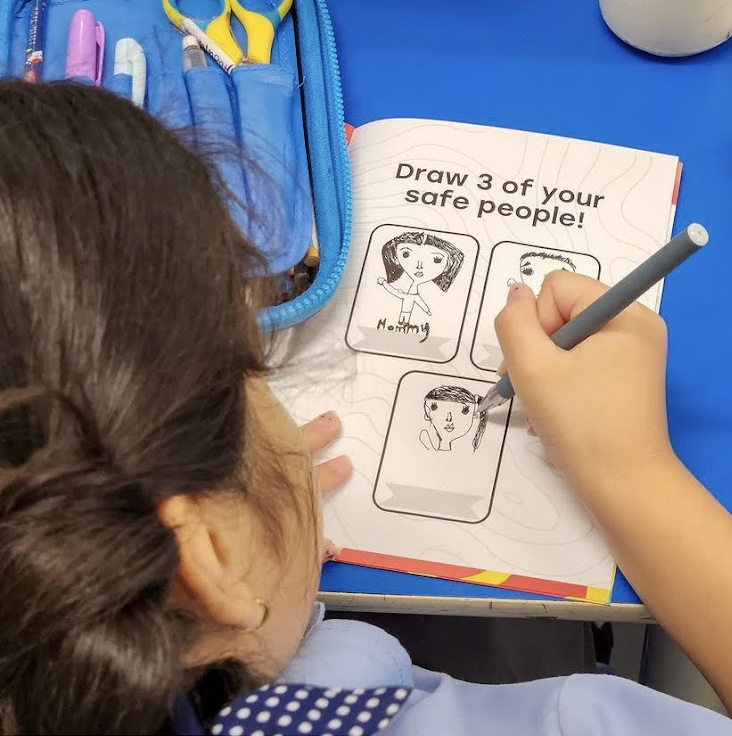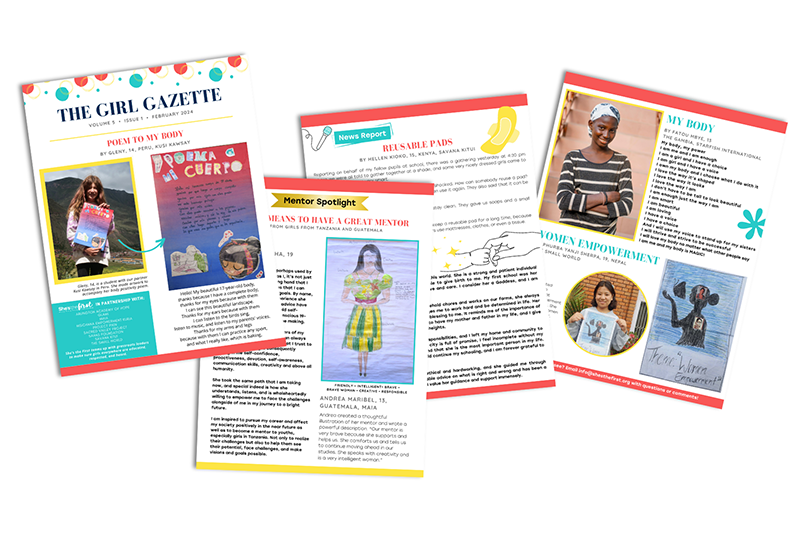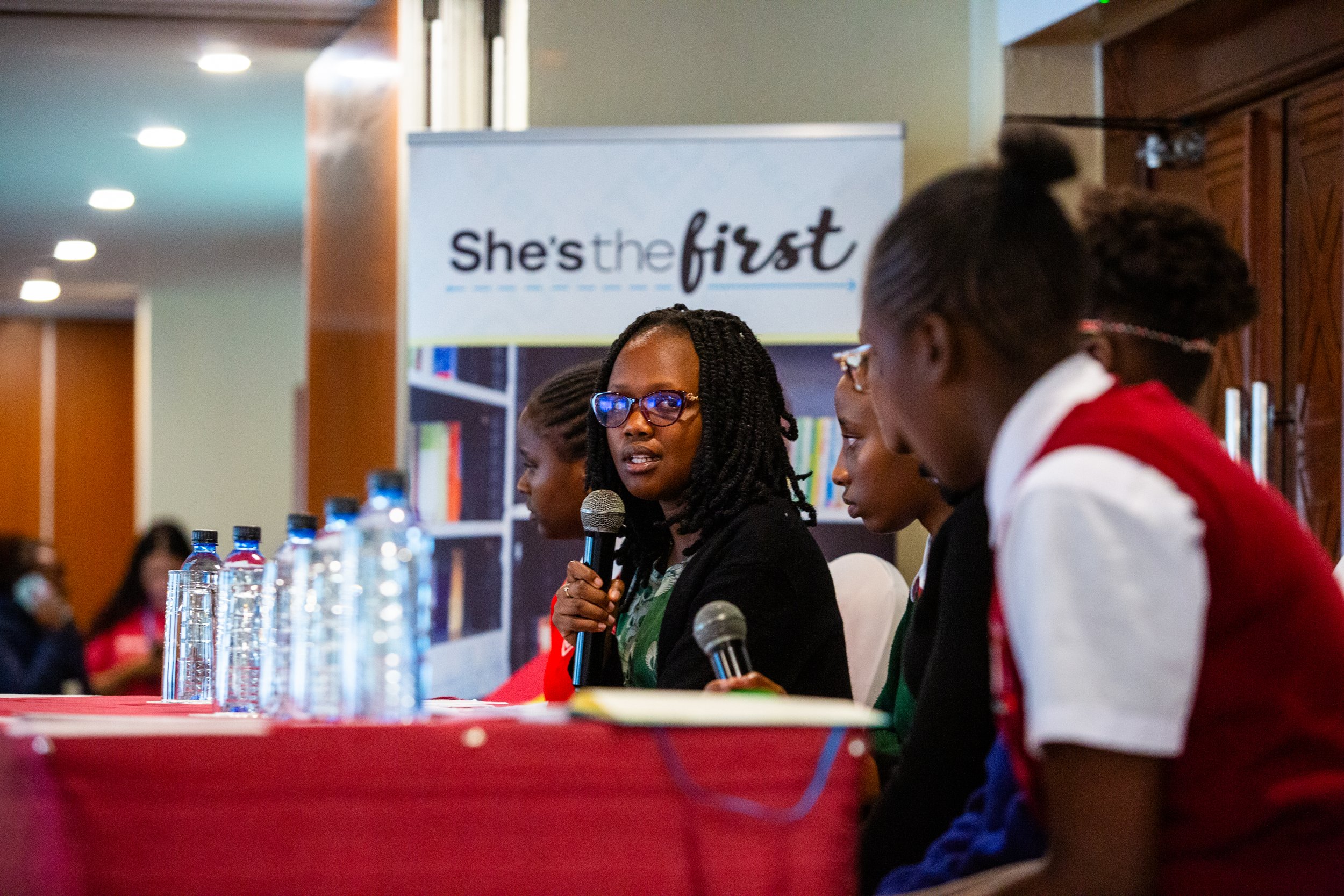We spoke with two of our Girl Activist Fellows about sex education, the spread of misinformation in their communities, and what changes they want to see. Sydney, 17, who lives in a conservative rural town in Massachusetts, U.S., pointed out that abstinence-only programs cause harm. Faith Boke, 21, from Kuria, Kenya, shared how her community faces shame and misinformation about menstruation and reproductive health. They talked about the need for thorough and inclusive sex education to clear up myths and reduce the stigma around reproductive health.
The Girl Gazette is Here!
The latest edition of The Girl Gazette is here! This edition features a powerful poem about girls' leadership, an important essay about a patriarchal community, and artwork that encourages girls to end period stigma and feel good about their bodies.
The Girl Gazette shares girls' voices from around the world who work with our Partner Coalition organizations. Girls from She’s the First’s Partner Coalition express themselves through art, poetry, and essays about their experiences.
I am Wonderfully Made
By Lucy Mutheu, Kenya, Savana Kitui
I am wonderfully made,
I appreciate my body,
I love and respect my body,
Oh! my body my choice.
Seeking for guidance and counseling,
Whenever i am troubled,
Will always help to became a better person,
Oh! my body my choice.
Nobody should touch me,
Nobody should abuse me because of my body,
I will always accept my body
Oh! my body my choice.
Lucy’s poem was also published in the September 2024 edition of The Girl Gazette, a biannual publication of artwork, poetry, and essays by girls in the She’s the First partner coalition.
My Body, My Choice
By Yassin Jarju, 15, a student in The Gambia with our partner Starfish International
In a world where choices are made,
my body, my voice will never fade.
For I am a girl, strong and true,
menstruation is a part of me too.
It's a natural cycle, a sign of life,
bringing strength and power
I embrace it with love, for it's a gift,
a reminder of the beauty that my body uplifts,
So let's celebrate the freedom we possess,
to make choices that honor our happiness.
for my body is mine, and I have a voice,
to stand up, to be heard, to make my own choice.
To all the girls out there, remember, you have the power,
to embrace your body, to accept yourself and to love yourself.
Together, we stand, strong and true,
supporting each other, me and you.
With respect and love, we'll always rejoice,
for our bodies are ours, and we have a choice.
In this journey of life, you're in control,
with every decision, let your spirit unfold.
No one else can define who I am,
my body is mine, a precious gem,
I embrace my body, and make all the choices
choices about me, choices about who I am.
I stand tall, with confidence and pride,
in my body, my sanctuary, where I reside.
I make the choices that feel right for me.
for my body is mine, and I am free.
A quote from Yassin’s poem was also published in the September 2024 edition of The Girl Gazette, a biannual publication of artwork, poetry, and essays by girls in the She’s the First partner coalition.
Going Beyond the Book: Behind-the-Scenes of “Safiya Speaks Up”
We’re proud to launch of Safiya Speaks Up, a children’s book and mentor’s guide written by girls between the ages of 15 and 21 from the She’s the First’s Girl Activist Fellowship. This “tell-all” is a memoir of the stories behind the book, as well as the memories we shared throughout its creation.
Reproduce This! Art Contest By Girls, For Girls: CALL FOR ARTWORK INSPIRED BY THE THEME: MY BODY, MY CHOICE
She’s the First is a non-profit organization that teams up with grassroots leaders to make sure all girls are educated, respected, and heard. As the co-organizers of The Global Girls’ Bill of Rights®, we stand by Right #5, which states: “All girls have the right to comprehensive sexual education and access to free, quality, reproductive healthcare.”
To uplift this right around the world and rally girls together, our Girl Activist Fellowship’s Sexual Health and Reproductive Rights Committee, a youth-led group in STF, is hosting the Reproduce This: Art Contest. The theme of this Art Contest is "Your Body, Your Choice," and we will be accepting all types of visual art mediums (sketches, watercolors, color pencils, acrylic, oils, etc).
*The only eligibility requirements: being a girl* who is less than 22 years old!
The Reproduce This: Art Contest is an art contest hosted by girls, for girls, and will raise awareness for reproductive rights around the world in a SAFE way. All girl-centered and anti-oppressive entries to the Reproduce This: Art Contest will be showcased on our website, and if that's not enough... Selected entries will be showcased in two simultaneous GALLERY SHOWS located in New York City and Nairobi, Kenya, on International Day of the Girl, October 11, 2023.
Create a difference, embrace your talents, and sign up today! Submit your art today!
Use this link to commit to creating artwork (deadline for submission is August 15): bit.ly/reproducethissubmit
*gender-nonconforming, genderfluid, transfeminine experiences included!
Download the flyer here.
Equal Access for ALL Girls to Period Products
While menstrual stigma has long been a political topic, one Hon. Gloria Orwoba made a very public plea for women’s and girls’ rights this year in a new and different way. A first-time senator, Hon. Orwoba made her way to the Kenya Parliamentary session on 14th February 2023 in clothing that had menstrual blood. She was asked to leave halfway through the session after her fellow parliamentarians requested the speaker to eject her for supposedly violating the house’s “dress code.” Hon. Orwoba’s actions made a strong statement to advocate for free pads for school girls and female prisoners. As a young woman at the forefront of addressing Period Poverty, this was such a relief for me.
A woman, content
Author: Jessica Chukwu
She does not want children
This feels contradictory
Mutually exclusive as if “she” and this particular desire cannot exist at the same time
She knows it’s religion not God that makes this phrase feel
The way it does
uneasy, as if something is out of order
a man would hear what I want and say “that’s out of order”
a woman would hear what I want and say “that’s out of order”
so I guess I’m out of orders
out of rules and restrictions
out of a need to think beyond myself, I guess I don’t have the woman “gene” or conviction
a contradiction
I am a postmodern woman, I have nothing to say to tradition.
it’s Christmas time, the room’s aroma is rich with jollof rice and chicken. My family are gathered around while “fresh prince” plays on the tv. We are laughing, conversing and catching up. A quick fire round of charades begins, the music blasting on speakers soon follows. The afro beats of the early 2000s take us back to our childhood. We sink deeper into the evening. Eating our sugar filled deserts. My aunty starts asking us about our goals, our future, what we think our families will be like, how many children we want. All of us are sitting in a circle like shape, the most intimate where the warmest conversations are born. The cousins are answering, response range from 2 to 5, we are laughing at each other’s answers and envisioning our cousins as parents.
As the gentle laughter dies down again so the next person can speak
I see that the next person is me.
I’m uncomfortable but they don’t know.
I blink and look at my aunty extra hard, maintaining eye contact, willing my eyes to waver so she will know I don’t want to answer. When this quickly failed I prayed to Gaia and hoped some womanly instinct would tell her to move on.
She doesn’t. So, I lie “I don’t know maybe 2 or 3, my aunty shoots a smile my way, nods and moves on to my little sister.
My answer was distant. Impersonal.
“How many children do you want?”, enquiring about secondary desires when you have already gotten my primary desire incorrect.
“How many children do you want?” the question preceding that, whether I even want children is already answered for me and I must accept it.
“How many children do you want?” a question that would like me to speak, a question that silences me.
So, I cannot.
often
a woman is seen as a mother in waiting.
I am a woman, content.
A girl with an education is unstoppable—but barriers like gender discrimination, poverty, and exploitation prevent many girls from reaching graduation. Our Youth Ambassadors created the Power of Poetry campaign to amplify girls' voices about this issue for Poetry Month and Global Action Week for Education.
Jessica Chukwu, 19, is from London and Nigeria. “Growing up the stencil that is consciously and subconsciously put onto girls via the media, family, and teachers’ expectations of what a ‘woman’ is, was prominent. The idea that there is a set of outer and inner characteristics that entrench one as a woman is a ridiculous and harmful narrative I am motivated to eradicate. Such notions limit and constrain creativity and freedom, as well as perpetuate shame for those that do not fit into this strict patriarchal mould. I think that is unfair, because creativity and freedom are the qualities that create a fulfilling life. I am passionate about women's rights because I believe women should be able to mould a life of their choosing, with their mind and their wants.” She enjoys writing poetry, and her favorite author is Chimamanda Ngozie Adichie.
End period shame, stigma and poverty.
Author: Hope Wambui Ochieng
I am a slum girl, sooo what. Being a slum girl does not make me less a girl, iam proud because I know my right of equality.
Going to school using a rug like a pad and oops I stain my dress, pointing fingers and laughter becomes the talk of the day, I gain courage to be strong for I have no one to defend me but am still proud to be a slum girl.
I can't fit in the group of girls, speaking fluent English, with branded clothes and a rich lifestyle but am still proud to be slum girl and cannot complain of what my parents didn't offer to me, could be that is what they had.....let's end period stigma, shame and stigma.
I hope wambui ochieng as a stands for the girl child to get free sanitary towels in my efforts to make this world a better place towards ending period poverty, stigma and shame. Iam I will and I must join sdg 17 in partnership to support sdg
3 for good health and well being
4 for quality education
5 for gender equality
And because iam a slum girl I salute and appreciate those faces that smile back when they hear my name HOPE the slum girl.
#endperiodpovertyandshame
A girl with an education is unstoppable—but barriers like gender discrimination, poverty, and exploitation prevent many girls from reaching graduation. Our Youth Ambassadors created the Power of Poetry campaign to amplify girls' voices about this issue for Poetry Month and the Global Action Week for Education.
Hope Wambui Ochieng, 12, was born and raised in Kibera, Nairobi, Kenya. “I started poetry at the age of 6 years, creating awareness and sending messages of hope. During covid era, as the school were closed down due to the pandemic, I saw girls stain dresses for using rags, and some approached me to talk to mum on their behalf so she could get them sanitary towels.” Hope used poetry as a way to advocate for for her school to provide sanitary towels to girls from vulnerable families . “I took up the task of requesting sanitary towels from well-wishers, organisations and try restore their dignity and respect back. My request is for more well wishers, organisations, partners from all walks of life to come on board, support my initiative and be the change she desires in life.” Follow Hope on Instagram at @hopethepoet.
Coming Back to Life: How I Started to Emotionally Heal After A Sexual Assault
Editor’s Note: Trigger Warning: sexual assault and suicidal ideation. Olwethu wrote to us because she wanted to share her experience of healing after trauma. She hopes that by sharing her story, other survivors will no longer feel alone. If you have experienced sexual assault, there are resources to help you.










